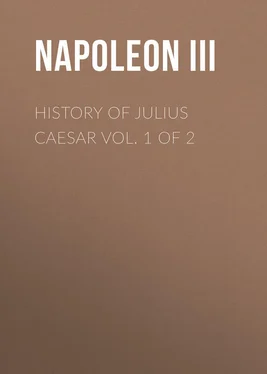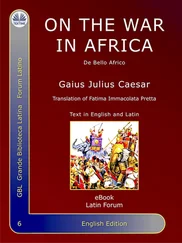Napoleon III - History of Julius Caesar Vol. 1 of 2
Здесь есть возможность читать онлайн «Napoleon III - History of Julius Caesar Vol. 1 of 2» — ознакомительный отрывок электронной книги совершенно бесплатно, а после прочтения отрывка купить полную версию. В некоторых случаях можно слушать аудио, скачать через торрент в формате fb2 и присутствует краткое содержание. Жанр: foreign_antique, foreign_prose, Биографии и Мемуары, на английском языке. Описание произведения, (предисловие) а так же отзывы посетителей доступны на портале библиотеки ЛибКат.
- Название:History of Julius Caesar Vol. 1 of 2
- Автор:
- Жанр:
- Год:неизвестен
- ISBN:нет данных
- Рейтинг книги:5 / 5. Голосов: 1
-
Избранное:Добавить в избранное
- Отзывы:
-
Ваша оценка:
- 100
- 1
- 2
- 3
- 4
- 5
History of Julius Caesar Vol. 1 of 2: краткое содержание, описание и аннотация
Предлагаем к чтению аннотацию, описание, краткое содержание или предисловие (зависит от того, что написал сам автор книги «History of Julius Caesar Vol. 1 of 2»). Если вы не нашли необходимую информацию о книге — напишите в комментариях, мы постараемся отыскать её.
History of Julius Caesar Vol. 1 of 2 — читать онлайн ознакомительный отрывок
Ниже представлен текст книги, разбитый по страницам. Система сохранения места последней прочитанной страницы, позволяет с удобством читать онлайн бесплатно книгу «History of Julius Caesar Vol. 1 of 2», без необходимости каждый раз заново искать на чём Вы остановились. Поставьте закладку, и сможете в любой момент перейти на страницу, на которой закончили чтение.
Интервал:
Закладка:
In making the privileges of the Roman citizen an advantage which every one was happy and proud to acquire, the Senate held out a bait to all ambitions; and this general desire, not to destroy the privilege, but to gain a place among the privileged, is a characteristic trait of the manners of antiquity. In the city not less than in the State, the insurgents or discontented did not seek, as in our modern societies, to overthrow, but to attain to. So every one, according to his position, aspired to a legitimate object: the plebeians to enter into the aristocracy, not to destroy it; the Italic peoples, to have a part in the sovereignty of Rome, not to contest it; the Roman provinces to be declared allies and friends of Rome, and not to recover their independence.
The peoples could judge, according to their conduct, what lot was reserved for them. The paltry interests of city were replaced by an effectual protection, and by new rights often more precious, in the eyes of the vanquished, than independence itself. This explains the facility with which the Roman domination was established. In fact, that only is destroyed entirely which may be replaced advantageously.
A rapid glance at the wars which effected the conquest of Italy will show how the Senate made application of the principles stated above; how it was skilful in profiting by the divisions of its adversaries, in collecting its whole strength to overwhelm one of them; after the victory in making it an ally; in using the aims and resources of that ally to subjugate another people; in crushing the confederacies which united the vanquished against it; in attaching them to Rome by new bonds; in establishing military posts on all the points of strategic importance; and, lastly, in spreading everywhere the Latin race by distributing to Roman citizens a part of the lands taken from the enemy.
But, before entering upon the recital of events, we must cast a glance upon the years which immediately preceded the pacification of Latium.
Submission of Latium after the first Samnite War.
IV. During a hundred and sixty-seven years, Rome had been satisfied with struggling against her neighbours to re-conquer a supremacy lost since the fall of her kings. She held herself almost always on the defensive; but, with the fifth century, she took the offensive, and inaugurated the system of conquests continued to the moment when she herself succumbed.
In 411, she had, in concert with the Latins, combated the Samnites for the first time, and commenced against that redoubtable people a struggle which lasted seventy-two years, and which brought twenty-four triumphs to the Roman generals. 183 183 Florus, I. 16.
Proud of having contributed to the two great victories of Mount Gaurus and Suessula, the Latins, with an exaggerated belief in their own strength and a pretension to equality with Rome, went so far as to require that one of the two consuls, and half of the senators, should be chosen from their nation. War was immediately declared. The Senate was willing enough to have allies and subjects, but it could not suffer equals; it accepted without scruple the services of those who had just been enemies, and the Romans, united with the Samnites, the Hernici, and the Sabellian peoples, were seen in the fields of the Veseris and Trifanum, fighting against the Latins and Volsci. Latium once reduced, it remained to determine the lot of the vanquished. Livy reports a speech of Camillus which explains clearly the policy recommended by that great citizen. “Will you,” he exclaims, addressing the members of the assembly, “use the utmost rigour of the rights of victory? You are masters to destroy all Latium, and to make a vast desert of it, after having often drawn from it powerful succours. Will you, on the contrary, after the example of your fathers, augment the resources of Rome? Admit the vanquished among the number of your citizens; it is a fruitful means of increasing at the same time your power and your glory.” 184 184 Titus Livius, VIII. 13, 14.
This last counsel prevailed.
The first step was to break the bonds which made of the Latin people a sort of confederacy. All political communalty, all war on their own account, all rights of commercium and connubium , between the different cities, were taken from them. 185 185 Titus Livius, VIII. 14. These towns had the right of city without suffrage; of this number were Capua (in consideration of its knights, who had refused to take part in the revolt), Cumæ, Fundi, and Formiæ.
The towns nearest Rome received the rights of city and suffrage. 186 186 Velleius Paterculus, I. 15.
Others received the title of allies and the privilege of preserving their own institutions, but they lost a part of their territory. 187 187 Titus Livius, VIII. 14.
As to the Latin colonies founded before in the old country of the Volsci, they formed the nucleus of the Latin allies ( socii nominis Latini ). Velitræ, alone, having already revolted several times, was treated with great rigour; Antium was compelled to surrender its ships, and become a maritime colony.
These severe, but equitable measures, had pacified Latium; applied to the rest of Italy, and even to foreign countries, they will facilitate everywhere the progress of Roman domination.
The momentary alliance with the Samnites had permitted Rome to reduce the Latins; nevertheless the Senate, without hesitation, turned against the former again as soon as the moment appeared convenient. It concluded, in 422, a treaty with the Gauls and Alexander Molossus, who, having landed near Pæstum, attacked the Lucanians and the Samnites. This King of Epirus, the uncle of Alexander the Great, had been called into Italy by the Tarentines; but his premature death disappointed the hopes to which his co-operation had given rise, and the Samnites recommenced their incursions on the lands of their neighbours. The intervention of Rome put a stop to the war. All the forces of the Republic were employed in reducing the revolt of the Volscian towns of Fundi and Privernum. 188 188 Titus Livius, VIII. 14, et seq. – Valerius Maximus, VI. ii. 1.
In 425, Anxur ( Terracina ) was declared a Roman colony, and, in 426, Fregellæ ( Ceprano? ), a Latin colony.
The establishment of these fortresses, and of those of Cales and Antium, secured the communications with Campania; the Liris and the Vulturnus became in that direction the principal lines of defence of the Romans. The cities situated on the shores of that magnificent gulf called Crater by the ancients, and in our days the Gulf of Naples , perceived then the dangers which threatened them. They turned their eyes towards the population of the interior, who were no less alarmed for their independence.
Second Samnite War.
V. The fertile countries which bordered the western shore of the peninsula were destined to excite the covetousness of the Romans and the Samnites, and become the prey of the conqueror. “Campania, indeed,” says Florus, 189 189 Florus, I. 16.
“is the finest country of Italy, and even of the whole world. There is nothing milder than its climate. Spring flourishes there twice every year. There can be nothing more fertile than its soil. It is called the garden of Ceres and Bacchus. There is not a more hospitable sea than that which bathes its shores.” In 427, the two peoples disputed the possession of it, as they had done in 411. The inhabitants of Palæopolis having attacked the Roman colonists of the ager Campanus , the consuls marched against that place, which soon received succour from the Samnites and the inhabitants of Nola, while Rome formed an alliance with the Apulians and the Lucanians. The siege dragged on, and the necessity of continuing the campaign beyond the ordinary limit led to the prolongation of the command of Publilius Philo with the title of proconsul, which appeared for the first time in the military annals. The Samnites were soon driven from Campania; the Palæopolitans submitted; their town was demolished; but they formed close to it a new establishment, at Naples ( Neapolis ), where a new treaty guaranteed them an almost absolute independence, on the condition of furnishing a certain number of vessels to Rome. After that, nearly all the Greek towns, reduced one after another, obtained the same favourable conditions, and formed the class of the socii navales . 190 190 Titus Livius, VIII. 26; XXI. 49; XXII. 11.
Интервал:
Закладка:
Похожие книги на «History of Julius Caesar Vol. 1 of 2»
Представляем Вашему вниманию похожие книги на «History of Julius Caesar Vol. 1 of 2» списком для выбора. Мы отобрали схожую по названию и смыслу литературу в надежде предоставить читателям больше вариантов отыскать новые, интересные, ещё непрочитанные произведения.
Обсуждение, отзывы о книге «History of Julius Caesar Vol. 1 of 2» и просто собственные мнения читателей. Оставьте ваши комментарии, напишите, что Вы думаете о произведении, его смысле или главных героях. Укажите что конкретно понравилось, а что нет, и почему Вы так считаете.












